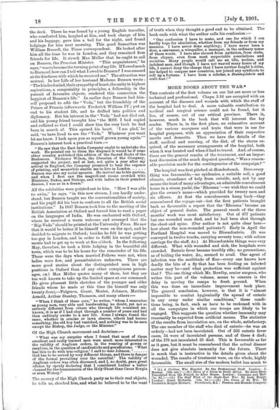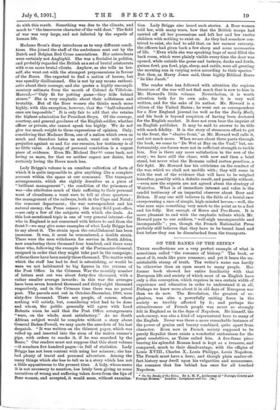MORE BOOKS ABOUT THE WAR.* THE contents of the first
volume on our list are more or less technical and professional. Chaps. 5-16 are occupied with an account of the diseases and wounds with which the staff of the hospital had to deal. A more valuable contribution to medical and surgical science could not be found, but it lies, of course, out of our critical province. There is, however, much in the book that will interest the lay reader. There is, in the first place, an exhaustive account of the various marquees and tents that were in use for hospital purposes, with an appreciation of their respective merits and demerits. Then we have the details of the staff, medical and nursing, of the diet, of the stores re- quired, of the necessary arrangements of the hospital, both when it was located and when it had to travel. And, of course, there are the general results of the treatment, and an impor- tant discussion of the much disputed question, " Was a reason- able provision made for the contingencies of the campaign ? "
The hospital was first pitched at Itondesbosch. Here every thing was favourable,—no epidemics, a suitable soil, a good climate, abundance of help from outside, and, not by any means the least of many advantages, an admirable convalescent home in a steam yacht, the Rhouma '—we wish that we could give the owner's name—which provided for twenty men and six officers. At first the convalescents hung back—they remembered the voyage out—but the first patients brought back so favourable a report that the Rhouma ' became an object of general desire. The general result of the three months' work was most satisfactory. Out of 477 patients but one wounded man died, and he had been shot through the chest and spine. (Our author is not quite clear here— how about the non-wounded patients ?) Early in April the Portland Hospital was moved to Bloemfontein. (It was conveyed in twelve tracks, carrying seventy tons ; with saloon carriage for the staff, &e.) At Bloemfontein things were very different. What with wounded and sick, the hospitals were crowded. Enteric fever became terribly rife; no precautions, as of boiling the water, &c., seemed to avail. One agent of infection was the multitude of flies—every one knows how deadly the bite of a fly that has been feeding on infected matter may be—and what protection was sufficient against that ? The one thing which Mr. Bowlby, senior surgeon, who writes this part of the volume, seems to censure is the delay in moving the camps to fresh ground. When this was done an immediate improvement took place. The general conclusion, however, is that it is " almost impossible to combat hygienically the spread of enteric in any army under similar conditions," these condi- tions being, in fact, such as have to be reckoned with in all the campaigns in which our troops are likely to be engaged. This suggests the question whether immunity may reasonably be expected from artificial means. The statistics of the results from inoculation are, on the whole, satisfactory. The one member of the staff who died of enteric -he was an orderly—had not been inoculated. Out of 232 enteric fever cases, 54 were of inoculated persons, and of these 4 died; of the 178 not inoculated 25 died. This is favourable as far as it goes, but it must be remembered that the actual disease does not give absolute immunity for the future. There is much that is instructive in the details given about the wounded. The results of treatment were, on the whole, highly favourable. The small size of the modern bullet has much to • (1.) A Civilian War Hospital By the Professional Staff. London : J. Murray. Ma. net.]—(2.) Diary of a Nurse in South Africa. By Alice Bros.Translated from the French by Alice Ropes. London: Chapman and HalL ISa. 6d.]—(3.) The Staff Work of the Anglo-Boer War. By Lady Brims. London : Grant Richards. [10s. 6d.]—(4.) The Chase of De Wet. BY Frederick Hoppir Howard. Providence, R.I. : Preston and Rounds Company. do with this result. Something was due to the climate, and much to " the innocuous character of the veld dust." The field of war was very large, and not infected by the seguelm of human life.
Madame Bron's diary introduces us to very different condi- tions. She joined the staff of the ambulance sent out by the Dutch and Belgian Red Cross associations. Her antecedents were certainly not AnglophiL She was a Socialist in politics, and probably regarded the British as a set of brutal aristocrats with el en more brutal clients. Anyhow, as she tells us her- self, she went out with the strongest prepossessions in favour of the Boers. She expected to find a nation of heroes, but was speedily disillusioned. She is not by any means• enthusi- astic about their courage, and she quotes a highly uncompli- mentary estimate from the mouth of Colonel de Villebois- Mareuil,—" Only fit for potting game—they hide behind stones." She is very emphatic about their selfishness and brutality. But of the Boer women she thinks much more highly, with this exception, however, that the " half-educated ones are impossible." It is only fair to add that she retains the highest admiration for President Steyn. Of the courage, courtesy, and general goodness of the English soldier, whether officer or private, she cannot speak too highly. We do not give too much weight to these expressions of opinion. Only, considering that Madame Bron, one of a nation which owes us much and therefore hates us much, went out with every prejudice against us and for our enemies, her testimony is of no little value. A change of personal conviction is a cogent piece of, evidence. Even Mr. Michael Dav;t4.. came back, not loving us more, for that we neither expect nor desire, but certainly loving the Boers much less.
Lady Briggs's volume is an omnibus collection of facts of which it is quite impossible to give anything like a complete account within the space at our command. The transport arrangements, which she rightly describes as a piece of " brilliant management " ; the condition of the prisoners of war—she attributes much of their suffering to their personal want of cleanliness, a want sure to tell at close quarters— the management of the railways, both in the Cape and Natal ; the remount department; the war correspondent and his natural enemy, the Press censor ; the Army field post-office, —are only a few of the subjects with which she deals. As this last-mentioned topic is one of very general interest—for who in England is not concerned with letters to and from the front P—we may give some examples of what Lady Briggs has to say about it. The strain upon -the establishment has been immense. It was, it must be remembered, a double strain. There were the men withdrawn for service in South Africa, now numbering three thousand four hundred, and there were those who, following the example of the Postmaster-General, resigned in order that.they might take part in the campaign; of these there have been nearly three thousand. The matter with which the staff has had to deal is astonishing, or would be were we not habituated to big figures in the returns of the Post Office. In the Crimean War the monthly number of letters sent out was about forty-five thousand, with a rather smaller average inwards ; in this war the averages have been seven hundred thousand and thirty-eight thousand respectively, and in the Crimean time there was no parcel post. The parcels sent out in October-December, 1900, were sixty.five thousand. There are people, of course, whom nothing will satisfy, but, considering what had to be done and where, the• public generally will agree with Lord Roberts when he said that the Post Office arrangements "were, on the whole, most satisfactory." As no South African subject would be complete without a story about. General Baden-Powell, we may quote the anecdote of his last despatch. "It was written on the thinnest paper, which was rolled up and inserted into the stem of the native runner's pipe, with orders to smoke it, if he was searched by the Boers." Our readers must not suppose that this stout volume —it numbers five hundred pages—is full of statistics. Lady Briggs has not been content with using her scissors ; she has had plenty of travel and personal adventure. Among the many things which she has to tell us is a -story which has not a little appositenesa to the present time. A lady, whose name it is not necessary to mention, has lately been giving us some narratives of wrong and suffering taken down from the lips of Boer women, and accepted, it would. seem, without examina- tion. Lady Briggs also heard such stories. A Boer woman told her, with many tears, how that the British troops had carried off all her possessions and left her and her twelve children with nothing to exist on. As they had somehow con- trived to exist, she had to add that, on her earnest entreaty, the .officers had given back a few sheep and some necessaries of life. " Even while she was speaking bags of meal filled the back room, which were plainly visible every time the door was opened, while outside the geese and turkeys, ducks and fowls, guinea fowl, pea fowl, pigs, sheep, and cattle, were all greeting the morning sun in varying notes according to their species." But then, as Harry Jones said, these highly Biblical Boers " lie like Jacob."
The reader who has followed with attention the copious literature of the war will not find much that is new to him in Mr. Howard's little volume. Nevertheless, it is worth attention both for its own sake, for it is very well written, and for the sake of its author. Mr. Howard is a citizen of the United States ; he went out as correspondent for a New England journal (as well as for the Daily Mail), and his book is beyond suspicion of having been doctored for the English market. It does not even bear the imprint of an English publisher. It may be said to answer to its title with much fidelity. It is the story of strenuous effort to get to the front, the "elusive front," as Mr. Howard well calls it, and not much more. When we are about three parts through the book, we come to " De Wet at Bay on the -Vaal," but, un- fortunately, our forces were not in sufficient strength to tackle him. Nor is there any more satisfaction in the rest of the story; we have still the chase, with now and then a brief stand, but never what the Romans called iustum praelium, a fair fight. Mr. Howard has his criticisms on the conduct of the war, which we shall not meddle with ; they will come in with the rest of the evidence that will have to be weighed hereafter, possibly with a definite result, and possibly without, —even now the experts are not agreed about the strategy of Waterloo. What is of immediate interest and value is the candid testimony of an impartial observer about Boer and Briton. If any one still believes in the fable of a brutal race overpowering a race of simple, high-minded heroes,—well, the wise man says something very much to the point as to a fool and his folly. But enough of Boers and Pro-Boers. It is more pleasant to end with the emphatic tribute which Mr. Howard pays to our soldiers, " well-nigh unconquerable and incomparable" ; yes, though the French Nationalist Press probably still believes that they have to be bound hand and foot before they can be disembarked from the transports.



















































 Previous page
Previous page